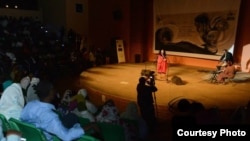One of the revivalists in Sudan’s film industry is Talal Afifi, a film curator, creative producer and human rights activist in Egypt and Sudan. Nowadays, he manages the production of documentaries and short films and leads workshops in filmmaking in Sudan.
“When we started working on documentaries, we experienced a problem,” says Afifi. “Most of Sudan’s history is not documented. This is one of the dilemmas that we suffer in Sudan. Documentaries are a good tool to enrich the experience of making feature movies.”
Afifi and some of his film colleagues joined forces to create a Sudan International Film Festival – a difficult task in a country whose industry nearly died two decades ago. They succeeded, however, in putting on a week-long film festival of works from Ethiopia, Kenya, Egypt and Sudan. One of his Sudan Film Factory’s works was shown.
Film empowers producer and audience
As a filmmaker, Afifi has learned the values of empowerment. His childhood curiosity about cinematography was fully realized when the Goethe institute offered to support the creation of his Sudan Film Factory four years ago.
The director turned the factory into a haven where young Sudanese can build their film skills and to expose the rest of Sudan to the power of film to change Sudan.
“Our work was based on fund-raising,” he says. “We submit feasibility studies to potential donors. We have most of the necessary equipment and technical staff from the Sudan Film Factory.
Critics from unexpected cultural quarters
The large audience attending the festival included major social and political figures of Sudan, Afifi says. There was no criticism from the government and no effort to censor the content of the films. But Afifi was surprised to draw sharp criticism from within the cultural community.
“We did not experience any censorship from the government or any other entity. The only negative pressure we endured did not come from the government or security; it came from the cultural society in Sudan whom we expected to support us.
The criticism was voiced by others in the burgeoning film industry; none other than members of the Sudanese Filmmakers Union. Afifi was surprised and disappointed by their criticism, but not discouraged.
Film to change Sudan
Afifi encourages young African artists to visit Sudan and produce joint projects. He’s now planning the next Sudan Film Factory festival, which will be bigger.
“Sudan is a country with diverse cultures that are worthy of attention,” he said and he called on filmmakers from the rest of Africa to come and join in the renaissance. “I would like to thank the youth of Sudan who gave us inspiration and energy and proved that if there is a will, there is a way.”
Afifi is looking for new ways to help independent filmmakers to produce documentaries because he believes film can make positive changes in Sudan.
“Documentary films and visual arts in general are very effective in drawing people’s attention. A piece of visual art captures attention and leaves an impact that will last according to how effective the piece is.
“Change is not done at once but rather it results from cumulative work targeted to awareness-raising and stimulating the will of the people and, of course, action and the ability to plan well.
“All of these elements have to work together for change to realize.
Afifi focuses on women’s rights
Human rights for men, women and children are a primary concern of the filmmaker. Women's right paly a prominet role in his films.
“The women’s status as citizens of Sudan is not appropriate,” he says. “They face lots of injustices in acquiring their rights, such as food and clothes, housing and education. Their standard of living needs lots of enhancements.”
Afifi has produced many documentary films about women’s issues in Sudan. He says the women of his country are experiencing many socio-economic, political, and cultural challenges.
One of Afifi’s documentaries targets the role of women on politics, and the progress being made by the Salmmah Women’s Resource Center as they developed a role for women in the last election.





